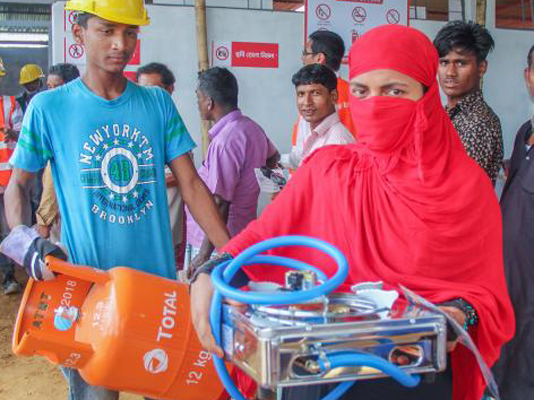COX’S BAZAR, Aug 17, 2018 (BSS) – A major environmental project to provide
around 250,000 families with liquid petroleum gas (LPG) stoves and gas
cylinders has been launched by UN agencies and Bangladesh government in Cox’s
Bazar to help prevent further deforestation linked to the Rohingya crisis.
At the official launch of phase one of the project yesterday, over 300
local villagers identified by local officials as extremely vulnerable and in
need of support, were the first to receive stove and gas sets. Thousands more
will be distributed to Rohingyas and other host community families over the
coming months, an IOM press release said.
The alternative fuel initiative is being organized by the UN Migration
Agency (IOM), UN Food and Agriculture Organisation (FAO), World Food
Programme (WFP) and UN Refugee Agency (UNHCR), working closely with
Bangladesh’s Ministry of Disaster Management and Relief (MODMR) and
Commissioner of Refugee Repatriation and Relief (RRRC).
The launch was attended by senior Bangladeshi officials including
Commissioner of Refugee Repatriation and Relief Mohammad Abul Kalam,
Divisional Commissioner of Chottagram Mohammad Abdul Mannan, and Deputy
Commissioner of Cox’s Bazar Mohammad Kamal Hossain.
Cox’s Bazar was home to significant areas of protected forest and an
important wildlife habitat. But the arrival of over 7 00,000 Rohingyas
fleeing violence in Myanmar over the past year led to massive deforestation
as desperate families cut down trees and cleared land to make space for
makeshift shelters.
With Rohingyas and many local villagers almost entirely reliant on firewood
for cooking, that damage has continued, and forest is being cleared at a rate
of 700 metric tonnes – the equivalent of around four football fields of trees
– each day. If cutting continues at the current rate, the area’s forest will
be completely destroyed by the end of 2019, according to UN estimates.
“This is a vitally important project which will not only help mitigate and
redress deforestation and environmental damage but will also play an
important role in improving health and safety in the local and refugee
communities,” said Sanjukta Sahany, head of IOM’s transition and recovery
team in Cox’s Bazar.
Smoke from firewood being burned in homes and shelters without proper
ventilation is a significant cause of health problems, particularly among
women and young children, who spend much of their time indoors.
“By curbing the extraction of firewood from the remaining forests, it
allows us to protect, re-enter and replant,” explained Peter Agnew, FAO’s
emergency response coordinator in Cox’s Bazar. He noted that the alternative
fuel project is part of the wider SAFE Plus project, which is designed to
improve economic livelihoods for host communities, and in turn overall food
security, as well as the resilience of the refugees, by empowering them
through skills development.
“Over the next three years, several thousand people from the local and
refugee communities will have livelihood opportunities working on forest
rehabilitation with the SAFE Plus project, in coordination with the forestry
department,” he said.



